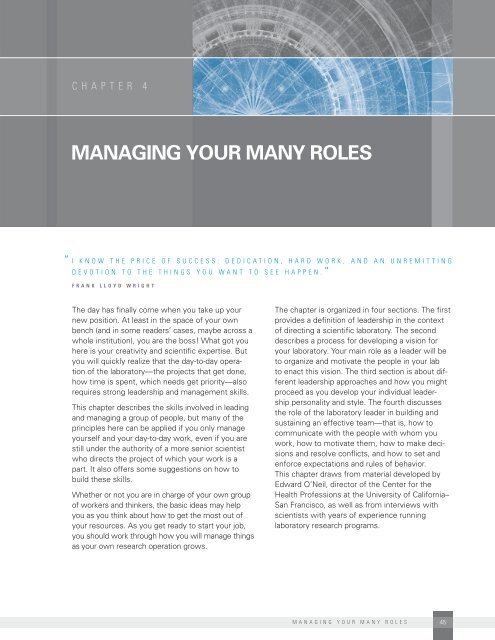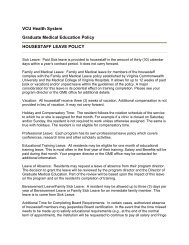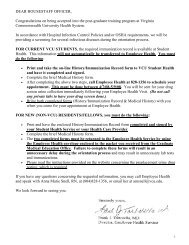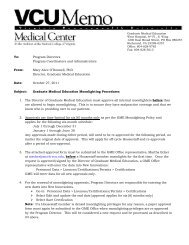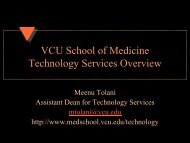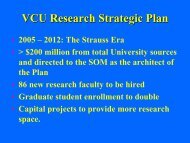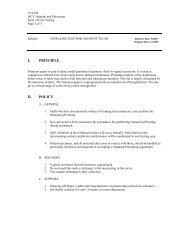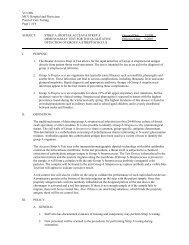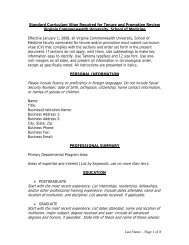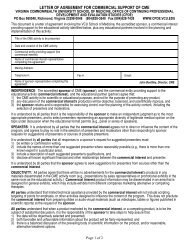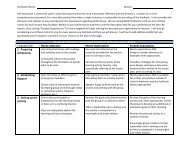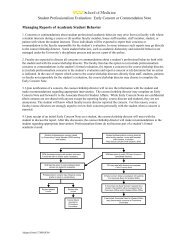n If there is an <strong>of</strong>fice that handles employee benefits,refer the employee to them for a discussion <strong>of</strong>eligibility for any benefits the institution may haveprovided.n Take notes that document this meeting and convertthem into an informal or formal memo to file.n Try to part on cordial terms. Science can be a smallworld, and your paths may cross again.Termination Letters and References. As part <strong>of</strong>final documentation, a termination letter may berequired by your institution or by law. In addition,you may be asked for, or may wish to <strong>of</strong>fer, areference. Check with the appropriate staff at yourinstitution about proper procedures.Immediate Dismissal. Sometimes the reasons fordismissal are more acute: dishonesty, endangeringothers, or other unusual behaviors may make itnecessary to immediately remove someone fromthe lab. You should get advice from your colleagueson how such a firing is normally done. How will youget any keys they may have or prevent them fromre-entering the premises? It may be that you shouldhave the person removed from the premises bylocal or campus authorities, for example, and thattheir personal effects will be sent to them later.RESOURCESBarker, Kathy. At the Helm: A Laboratory Navigator. ColdSpring Harbor, NY: Cold Spring Harbor Laboratory Press, 2002.OnlineAustin, Robert D. “Managing Knowledge Workers.” Science’sScience.Careers.org (April 26, 2002), http://sciencecareers.sciencemag.org/career_development/previous_issues/articles/1470/managing_knowledge_workers/.HRhero.com. Extensive resources on firing: http://www.hrhero.com/topics/firing.html.Seeding Labs’ website is www.seedinglabs.org.Siering, Marlene. “Hire the Best.” Denver Business Journal(November 17, 1997), http://www.bizjournals.com/denver/stories/1997/11/17/smallb2.html.<strong>University</strong> <strong>of</strong> Michigan Employment and Executive Services.“Conducting a Successful Employee Selection Process,” http://www.hr.umich.edu/empserv/department/empsel/index.html.appendixTelephone Interview OutlineDate:Candidate:Investigator’s Questions (Use openendedquestions, and ask for examples.)To see if we might fit, give me an idea <strong>of</strong>what you are looking for.What are your goals for this position?(short-term expectations, long-term plans)Tell me about yourself as a scientist:n What are your strengths?n What are your weaknesses?n What do you want to learn?n What are you looking for in a supervisor?What is your preferred interaction style?(with me, with others, on joint projects)Timing, current jobVisa statusInvestigator’s CommentsBackground, interests, goalsThe projects we are working onWhat I am looking forWhat I expect (enthusiastic, interested,communicative, a hard worker,responsible)What I will <strong>of</strong>fer (be there, help,communicate, support career withcommunication about goals, funding for[e.g., length <strong>of</strong> time])The university, department, townTiming, constraintsThis interview form is adapted from one developed byTamara L. Doering, Washington <strong>University</strong> School <strong>of</strong> Medicine.<strong>University</strong> <strong>of</strong> Michigan Employment and Executive Services.“Electronic Recruitment Resources,” http://www.hr.umich.edu/empserv/department/empsel/electronic.html.44 excellence everywhere
chapter 4managing your many roles“ I know the price <strong>of</strong> success: dedication, hard work, and an unremittingdevotion to the things you want to see happen.”frank lloyd wrightThe day has finally come when you take up yournew position. At least in the space <strong>of</strong> your ownbench (and in some readers’ cases, maybe across awhole institution), you are the boss! What got youhere is your creativity and scientific expertise. Butyou will quickly realize that the day-to-day operation<strong>of</strong> the laboratory—the projects that get done,how time is spent, which needs get priority—alsorequires strong leadership and management skills.This chapter describes the skills involved in leadingand managing a group <strong>of</strong> people, but many <strong>of</strong> theprinciples here can be applied if you only manageyourself and your day-to-day work, even if you arestill under the authority <strong>of</strong> a more senior scientistwho directs the project <strong>of</strong> which your work is apart. It also <strong>of</strong>fers some suggestions on how tobuild these skills.Whether or not you are in charge <strong>of</strong> your own group<strong>of</strong> workers and thinkers, the basic ideas may helpyou as you think about how to get the most out <strong>of</strong>your resources. As you get ready to start your job,you should work through how you will manage thingsas your own research operation grows.The chapter is organized in four sections. The firstprovides a definition <strong>of</strong> leadership in the context<strong>of</strong> directing a scientific laboratory. The seconddescribes a process for developing a vision foryour laboratory. Your main role as a leader will beto organize and motivate the people in your labto enact this vision. The third section is about differentleadership approaches and how you mightproceed as you develop your individual leadershippersonality and style. The fourth discussesthe role <strong>of</strong> the laboratory leader in building andsustaining an effective team—that is, how tocommunicate with the people with whom youwork, how to motivate them, how to make decisionsand resolve conflicts, and how to set andenforce expectations and rules <strong>of</strong> behavior.This chapter draws from material developed byEdward O’Neil, director <strong>of</strong> the Center for theHealth Pr<strong>of</strong>essions at the <strong>University</strong> <strong>of</strong> California–San Francisco, as well as from interviews withscientists with years <strong>of</strong> experience runninglaboratory research programs.managing your many roles45
- Page 3 and 4: A R e s o u r c e f o r S c i e n t
- Page 5 and 6: Table of ContentsVII119PrefaceChapt
- Page 7: 135 Chapter 10E x p a n d i n g Y o
- Page 15 and 16: Q u e s t i o nq&aWhat Is a “Tenu
- Page 17: preparing for immediate submission,
- Page 22 and 23: Practicing the Talkn Practice your
- Page 24 and 25: your one-on-one interviews you have
- Page 26 and 27: If talking directly about money is
- Page 28 and 29: When the institution responds and y
- Page 30 and 31: equipment and supplies. Maintenance
- Page 32 and 33: Q u e s t i o nq&aIs your instituti
- Page 34 and 35: Working With Human SubjectsWhether
- Page 36 and 37: RESPONSIBILITIES BEYONDTHE LABORATO
- Page 38 and 39: UNDERSTANDING YOURINSTITUTION AND H
- Page 40: Criteria for PromotionStructure of
- Page 45 and 46: Q u e s t i o nWhat’s in a Name?q
- Page 47 and 48: Screening ApplicantsWhen you review
- Page 50 and 51: Interpersonal Skillsn How important
- Page 52 and 53: Multinational Organizations are hir
- Page 57 and 58: n Seek funding and publish papers (
- Page 59 and 60: In fact, even though you yourself h
- Page 61 and 62: n Craft a statement that you feel c
- Page 63 and 64: n When you delegate authority to so
- Page 65 and 66: n Use only pens, preferably with wa
- Page 67 and 68: Strategy sessionsShould you decide
- Page 69 and 70: Finding Good Papers for Journal Clu
- Page 71 and 72: If possible, invite people in your
- Page 73 and 74: Q u e s t i o nq&aHow do I avoid po
- Page 75 and 76: The International Committee of Medi
- Page 77 and 78: Managing Conflictin the LabConflict
- Page 79 and 80: steps for dealing with conflictWhen
- Page 81 and 82: chapter 5managing your time“ Succ
- Page 83 and 84: Check your work: the 90-year though
- Page 85 and 86: n Make and keep appointments with y
- Page 87 and 88: n Help them seek advice without tak
- Page 89 and 90: FAMILY MATTERSMany scientists face
- Page 91 and 92: chapter 6project management“ We m
- Page 93 and 94: My project is to get a grant funded
- Page 95: ObjectivesObjectives are the end re
- Page 98 and 99: The key events schedule and the act
- Page 100 and 101: Microsoft Project, a program that s
- Page 102 and 103: Martin, Vivien. Managing Projects i
- Page 104 and 105:
appendix II: Example of a Work Brea
- Page 106 and 107:
appendix iv: Example of a Gantt Cha
- Page 108 and 109:
e h i n d c l o s e d d o o r s :w
- Page 110 and 111:
Who might be interested in supporti
- Page 112 and 113:
Call your program officerProgram of
- Page 114 and 115:
direct costs vs. indirect costsDire
- Page 116 and 117:
RESOURCESAllen, Ernest M. “Why ar
- Page 118 and 119:
the next generation of students (th
- Page 120 and 121:
Seek Feedback through a Formal Peer
- Page 122 and 123:
Encouraging Student Questionsn Do n
- Page 124 and 125:
Here are some ways you can help the
- Page 126 and 127:
n Are there curriculum changes unde
- Page 128 and 129:
a relaxed format for talking about
- Page 130 and 131:
spend in preparing an effective cou
- Page 132 and 133:
The Publishing ProcessTypes of Jour
- Page 134 and 135:
A word about impact factorsThe impa
- Page 136 and 137:
C r e a t i n g a n i n t e g r a t
- Page 138 and 139:
may need to take the first author p
- Page 140 and 141:
submitting image filesToday, most i
- Page 142 and 143:
Submitting your Paper to Another Jo
- Page 144 and 145:
RESOURCESDavis, Martha. Scientific
- Page 146 and 147:
increase your impact as a scientist
- Page 148 and 149:
Q u e s t i o nq&aHow do I communic
- Page 150 and 151:
n Offer criticism and correction in
- Page 152 and 153:
It is important to discuss career g
- Page 154 and 155:
When Mentoring,Advisory, or Supervi
- Page 156 and 157:
For researchers in developing count
- Page 158 and 159:
n Is travel safe and convenient, or
- Page 160 and 161:
n The expected contribution of each
- Page 162 and 163:
Meetings. Set up systems to ensure
- Page 164 and 165:
SPECIAL CHALLENGESFOR THE BEGINNING
- Page 166 and 167:
e an important connection to future
- Page 168 and 169:
The invention of a new method or pr
- Page 170 and 171:
licensee, who can charge others for
- Page 172 and 173:
Most profound for developing countr
- Page 174 and 175:
Finally, the patents have been chal
- Page 176 and 177:
And, India benefited as a supplier
- Page 178 and 179:
paperwork involved in purchasing1.
- Page 180 and 181:
labeling mattersA case in point: In
- Page 182 and 183:
equipment, freeze-drying equipment,
- Page 184 and 185:
Responsibilityfor materialsIf an or
- Page 186 and 187:
Recent Improvementsin Materials Tra
- Page 188 and 189:
“Knowledge is power.” —Sir Fr
- Page 190 and 191:
MOUMemorandum of UnderstandingRFPRe
- Page 192 and 193:
notes continued182 excellence every
- Page 194:
notes continued184 excellence every


